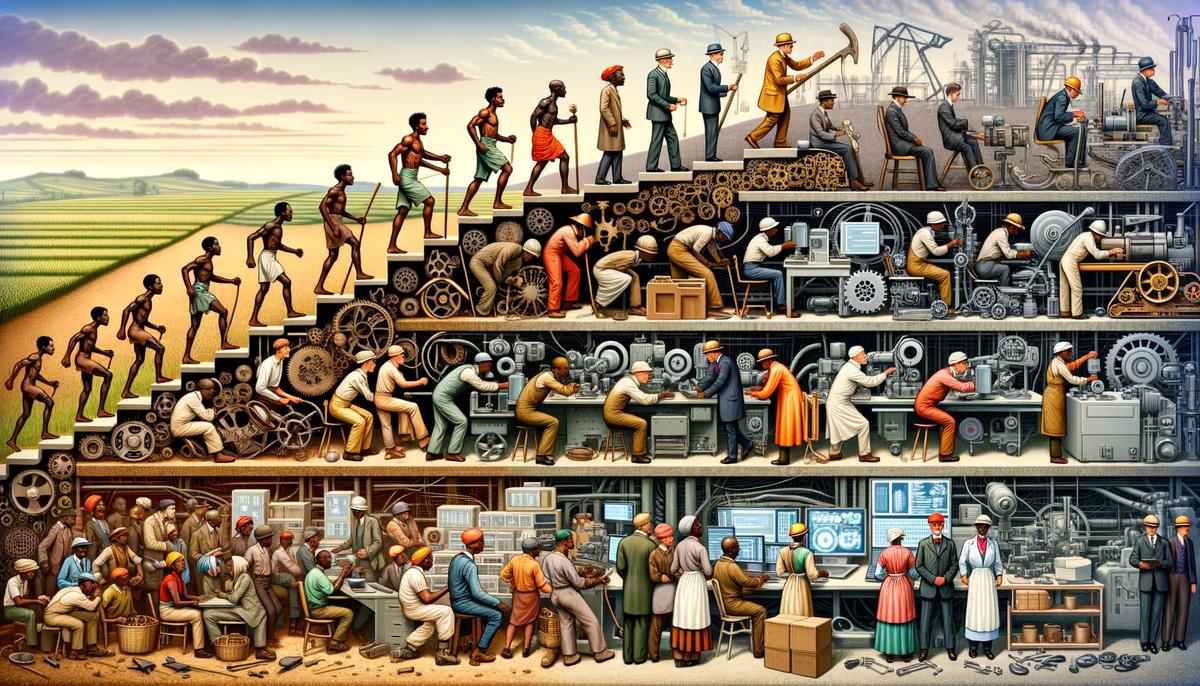
SA Job Market Outlook 2024
The landscape of the South African job market presents a picture that is both complex and evolving. This narrative seeks to shed light on the current state and future prospects of employment in the region, taking into account the various sectors that are showing promise amidst challenges. The focus is on understanding how different industries are adapting and what this means for job seekers and the economy at large.
Current State of the South African Job Market
The job landscape in South Africa mirrors a complex tapestry influenced by both its rich history and current global shifts. As of the latest reports, the unemployment rate hovers at a critical point, challenging both the populace and policymakers. This figure dramatically illustrates the gap between supply and demand in the job market.
- Driving the economy forward, several industries stand out as beacons of opportunity. Agriculture, mining, and manufacturing have traditionally been the pillars, but the digital and service sectors are now carving significant paths. These newer players offer a glimmer of hope, hinting at diverse skills and innovation becoming crucial to economic resilience.
The advent of the global pandemic served as a catalyst for change, highlighting vulnerabilities and stoking adaptability simultaneously. Many sectors faced downturns, but this period also underscored the value of technology and remote capabilities. As such, a shift toward a more digital economy is evident, creating new roles while reshaping traditional ones.
- Given these conditions, the job market’s landscape is as much about combating current challenges as it is about gearing up for future opportunities. This moment presents a call to action for skill development and educational reform to sync with the evolving economic needs.
As a microcosm of broader global challenges, South Africa’s employment issues speak to the interplay between economic strategies, technology uptake, and educational advancement. The current scenario showcases not just hurdles but also the strides being made towards adaptation and growth.

Emerging Job Sectors in South Africa
With an eye on the future, technology expansion stands as a cornerstone for progress. In South Africa, the tech sector isn’t just buzzing; it’s booming. Fueled by innovative startups, this industry’s rapid growth spurs from a demand for digital solutions. Especially in areas like fintech, where services merge financial tasks with ease through apps, South Africans are seeing a transformation. Companies are leaping from traditional modes to embrace technology, affecting banking, insurance, and everyday shopping.
Renewable energy sails into view as a shining beacon of growth. Given the country’s abundant sunshine and coastlines, solar and wind power aren’t just options; they’re necessities. As the globe turns its back on carbon, South Africa gears up to ride the renewable wave. Investments flow toward constructing solar farms and wind turbines, creating not only electricity but jobs. This green shift powers more than homes. It lights up opportunities for engineers, project managers, and maintenance crews, electrifying the job market.
Tourism paints another rich stroke on South Africa’s economic canvas. Known for its breathtaking landscapes and diverse cultures, the nation attracts globetrotters. Post-pandemic, this sector aims for a massive rebound. With travelers keen to explore again, hospitality, leisure, and transportation gear up for a bustling era. Jobs sprout in hotels, restaurants, and tourist sites, weaving a tapestry of employment opportunities across regions.
Agriculture roots itself as an enduring source of growth. Despite modern shifts, farming keeps its essence, feeding millions and exporting flavors worldwide. Innovations in agricultural tech, however, sprinkle fresh seeds. Drones monitor crops, while smart irrigation systems conserve water. This blend of tradition and innovation promises a fertile future for job seekers.
Rounding off the spectrum, education emerges as a pivotal sector. A country’s growth chains to the quality of its education. Recognizing this link, focuses sharpen on reforming schools and universities. Beyond traditional subjects, curricula now embrace tech skills, green energy basics, and entrepreneurial thinking. This update aims not just to fill current jobs but to prepare youth for future waves of employment, setting sail toward tomorrow’s opportunities.
In layers of progress, these sectors knit together South Africa’s growth story. From tapping solar power to expanding digital desks, each stride propels the nation forward. Job landscapes reshape, mirroring these forefronts of advancement. And as talents align with these rising industries, South Africa edges closer to carving a robust economic narrative for 2024 and beyond.

Skills and Education for Future Jobs
As South Africa strides into 2024, artificial intelligence (AI) and machine learning become mainstays in the job market, shaping the skills and education required for future job seekers. Professionals skilled in AI development, data analysis, and cybersecurity will find themselves propelled to the forefront of the hiring line. With businesses increasingly relying on algorithms and data-driven strategies to make decisions, expertise in these areas will not just be preferred but necessary.
The demand for cybersecurity experts is tied directly to the digital expansion seen across South Africa’s sectors. As companies navigate the complex web of online threats, individuals with the knowledge to protect and recover data assets will find themselves crucial. The rise in digital transactions, remote work, and cloud storage multiplies vulnerability points, thus heightening demand for robust cybersecurity measures.
In parallel, green jobs gain momentum, particularly in sustainable agriculture and waste management. Specialists in permaculture design and green technology implementation will see rising opportunities as the country commits further to sustainable practices. Education and skills around recycling technology, water conservation techniques, and sustainable urban planning will not only be in demand but also heralded as essential for future generations.
With the health sector’s reliance on technology escalating, biotech and healthcare innovation present fertile ground for professionals. Skills in genetic engineering, telehealth services, and health informatics pave new paths for healthcare delivery and medicine. There’s an impending boom for technically skilled healthcare practitioners who can merge patient care with technological savvy, contributing to improved health outcomes at a reduced cost.
Education itself stands on the cusp of a revolution with e-learning taking a front seat. E-Learning specialists, digital content creators, and virtual classroom managers will lead the charge in transforming educational norms. With remote learning proving its efficacy and flexibility, advanced technological skills paired with traditional teaching methods will reform education’s future landscape.
On the flip side, soft skills receive a fresh wave of acknowledgment in importance. Critical thinking, adaptability, and emotional intelligence emerge as non-negotiable assets, propelling individuals to maintain human-centric interactions amid the mechanization of processes. Employers value team members who can navigate challenges with a balanced approach combining emotional insight with practical solutions.
To keep pace with these emerging trends, vocational training centers and higher education institutions bear a significant responsibility to overhaul curriculums. Integration of green technology principles, AI basics, digital literacy, and emphasis on transferable soft skills become keystones of educational reform. Bridging the gap between traditional education and in-demand market skills encompasses a dual approach—partnering with industries for real-world experience and embedding futuristic technology understanding within academic programs.
Navigational skills across a digitally-driven landscape remain imperative as well. Understanding the essence of digital marketing, SEO basics, and online transaction security forms a fundamental layer for professionals in almost every sector. As digital platforms become the mainstay of customer interactions, being digitally literate isn’t optional but mandatory.
On an environmental note, climatology and water resource management expertise mirror the nation’s dedication to combating climate change effects. South Africa’s unique positioning demands specialized knowledge in managing its precious water reserves and developing climate-resilient agriculture, presenting a whole host of opportunities for environmental scientists and water management experts.
Lastly, the concept of lifelong learning steals the spotlight. Continuous, self-driven education becomes the norm as workers consistently upskill to stay relevant in a rapidly evolving job market. Automation reminds us that no job is forever safe from technology’s reach, necessitating an enduring commitment to learning as the true job security.

Impact of Technology on Employment
As robots and smart systems become more commonplace in South African industries, manual labor and routine jobs face a significant risk. These kinds of positions, often characterized by repetitive tasks, are exactly where technology aims to bring efficiency and cost reduction. This shift isn’t just limited to factories or assembly lines; it’s seeping into the service sector too, where automation technologies can handle bookings, inquiries, and even basic customer service tasks. The silver lining, however, is the surge in demand for jobs that cannot be easily automated – ones requiring emotional intelligence, creativity, and complex problem-solving abilities.
The digital gap in South Africa, starkly dividing those with access to technology and those without, introduces another complex layer to the technology-induced job market evolution. For folks in urban areas, with better access to broadband and digital tools, the transition might seem a stepping stone to greener pastures. Yet, for many in rural or underserved communities, this rapid digital transformation exacerbates the struggle to stay afloat in the job market.
Efforts to bridge this divide are underway, with initiatives targeting digital literacy and infrastructure expansion to the most remote corners of South Africa. These measures, crucial for leveling the playing field, also open up pathways to remote work opportunities. It’s worth noting that the global shift towards remote work cultures could serve as a boon to South Africa’s job market, offering an avenue for its workforce to plug into global job opportunities previously out of reach due to geographic barriers.
In contrast to the displacement narrative, some sectors are witnessing a boom thanks to tech advancements. The demand for software developers, data analysts, and digital marketers shows no signs of slowing down. This digital skills demand goes beyond the tech sector, permeating traditional industries like mining and agriculture, which are increasingly relying on tech solutions for efficiency and sustainability.
To adapt, educational institutions are pivoting towards more tech-centric curriculums, integrating coding, web development, and digital marketing into course offerings. Moreover, vocational training is getting an overhaul, emphasizing practical tech skills that align with emerging industry needs. This emphasis on tech education is critical for equipping the next generation with the tools necessary to navigate and thrive in the evolving job landscape.
The innovation wave doesn’t just stop at traditional market sectors. It’s sprawling across new frontiers, heralding the advent of jobs that barely existed a decade ago. Think of positions in drone piloting for agricultural surveying, blockchain experts for finance, and specialists in 3D printing – fields that are just beginning to blossom in South Africa.
What this evolution underscores is a transformation – not just an elimination – of jobs. Yes, technology threatens traditional roles, but it also relentlessly creates new avenues for employment that we’re only beginning to grasp. With careful planning and inclusive policy-making, South Africa can harness this tech wave not as a job destroyer but as a job creator par excellence. As industries evolve and new roles emerge, the collective challenge will be ensuring that the workforce is ready – not just to meet the demands of new tech-influenced economies but to drive innovation and growth in them.

Government and Private Sector Initiatives
The South African government, aware that fostering employment is key to robust economic health, has rolled out several initiatives. A prime focus area is youth employment; historical data indicates that the youth often bear the brunt of unemployment. To tackle this, the government introduced the Youth Employment Service (YES) initiative. YES aims at creating pathways for young people to gain demonstrable work experience, enhancing their employability.
Small businesses play a vital role in job creation. Recognizing this, the government launched the Small Enterprise Development Agency (SEDA) to support these businesses. SEDA provides various services like business planning, training, and market access to strengthen small enterprises, critical for economic diversification and job creation.
- Partnerships between the public and private sectors have been pivotal. For instance, collaborations exist to re-skill the workforce. With rapid technological changes rendering some jobs obsolete, there’s a shift to adapt the labor force to new economic realities. Programs focusing on digital skills, green technologies, and advanced manufacturing processes are being rolled out, aimed at equipping workers with skills relevant for tomorrow’s job market.
These efforts are complemented by a focus on innovation, recognizing that technological advancement drives economic growth. Through vehicles like the Technology Innovation Agency (TIA), the government encourages the development of tech startups and innovative SMEs. This not only fosters job creation in cutting-edge sectors but also positions South Africa as a tech hub in Africa.
Another aspect is the recognition of the informal sector’s role in livelihoods for many South Africans. Efforts to formalize portions of this sector—and provide training and resources to informal workers—reflect a holistic approach to job growth. By doing so, the government aims at not only increasing employment numbers but also at improving job quality and security.
The National Development Plan (NDP) underpins these initiatives with long-term goals for reducing unemployment. By setting ambitious targets, the plan seeks to mobilize resources across society to address joblessness comprehensively.
Lastly, addressing barriers to entering the job market is part of the strategy. Initiatives ensuring broader access to high-quality education and vocational training aim to break down these barriers. By doing so, they’re laying the foundation for a more inclusive economy that offers opportunities for all, regardless of background.
These programs and policies represent a multi-pronged approach to bolstering job growth in South Africa. By tackling both the supply (job seekers) and demand (employers) sides of the labor market, the initiatives aim to create a vibrant, inclusive economy capable of sustaining growth and improving lives.

In conclusion, the South African job market is at a crossroads, facing both significant challenges and opportunities. The key takeaway is the critical role of adapting to technological advancements and the green economy. These elements are not just reshaping the job landscape but are also pivotal in driving economic growth and ensuring a sustainable future for employment in South Africa.

Share
Facebook
X
LinkedIn
Telegram
Tumblr
WhatsApp
VK
Mail